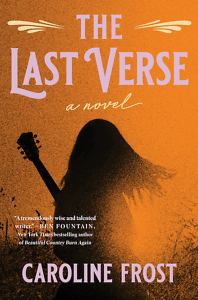Chasing the Dream
Caroline Frost’s The Last Verse sets a mystery in 1970s Nashville
Caroline Frost’s second novel, The Last Verse, looks at Nashville in the 1970s through the eyes of a young woman trying to make it in the music industry.

Twyla Higgins, 19, longs to break away from the oppressive atmosphere of her small Texas town. Since the death of her musician father, her mother has become obsessed with religion, changing her name to Faith and burning all the records in their home:
It was around this time that Twyla came home from school to a bonfire in her front yard. The smell of burning plastic and thick black smoke had drawn the neighbors outside to watch Faith as she tossed her ladies’ magazines, lingerie, bottles of booze, and Harlequin books into the fire. … Then Faith opened a cardboard box full of records. … To Twyla’s horror, she lifted the box and set the whole thing on the bonfire, shaking up orange sparks and embers.
Saving money from her job at the church daycare center, Twyla plans to get her own place and start her own life as soon as she can. But when Faith insists that Twyla go on a mission trip to Costa Rica and use her saved money to do so, Twyla realizes she must break away. The death of Elvis Presley provides the impetus. She escapes from home, takes a bus to Memphis for the King’s funeral, then hitches a ride to Nashville to make it as a songwriter.
Twyla, armed with only a small suitcase and her daddy’s guitar, will remind readers of the hundreds of young people who come to Nashville each year. Her first view of Broadway is probably as true today as it was 50 years ago (except for the prices):
Country music floated out of the open doors of bars and honky-tonks. A clock tower read ten after seven. Twyla counted her money. After paying for food and pitching in for gas, she had forty-seven dollars left, enough for a few nights in a motel or a ticket back. She started walking, hoping the movement would ward off the nerves. She told herself to keep it simple. First, she’d have to find a place to stay. Then she’d try to get a job.
 At first, things seem to be going Twyla’s way. She gets a job as a live-in nanny. She goes out to various small bars and puts her name in the draw on writers’ nights. And she meets another musician and falls in love. But then in a turn worthy of Edith Wharton, Twyla faces a series of challenges that threaten not only her dream of being a professional songwriter, but her very freedom and life. A song of hers is stolen, and she becomes involved in a crime.
At first, things seem to be going Twyla’s way. She gets a job as a live-in nanny. She goes out to various small bars and puts her name in the draw on writers’ nights. And she meets another musician and falls in love. But then in a turn worthy of Edith Wharton, Twyla faces a series of challenges that threaten not only her dream of being a professional songwriter, but her very freedom and life. A song of hers is stolen, and she becomes involved in a crime.
It’s then that Twyla’s story intersects with that of 52-year-old T. Lynn Struthers. Struthers, after being fired from the Metropolitan Nashville Police department, is forced to take workmen’s comp cases, making her a “professional tattletale” and unable to pay her bills. When a Belle Meade couple ask her to look for their missing son, she sees not only a way to pay those bills but a way to get her badge back. As Struthers gets closer to that goal, Twyla is in danger of losing everything.
The Last Verse reflects many of the themes of country music itself: longing, love, betrayal, death, and redemption. Frost depicts the Nashville of a half-century ago, and longtime residents will enjoy the memories. But the novel also reveals that the more things change, the more they stay the same. There are still young people who arrive hoping to make it in the music business. A lot of them get chewed up and return home. There are those who care only about becoming famous and those who care deeply about the music. Even as Twyla becomes more desperate, she has to make the same choices today’s striving musicians do, and it’s her choices that will stay with readers after they turn the novel’s last page.

Faye Jones, dean of learning resources at Nashville State Community College, writes the Jolly Librarian blog for the college’s Mayfield Library. She earned her doctorate in 19th century literature at Indiana University of Pennsylvania.


